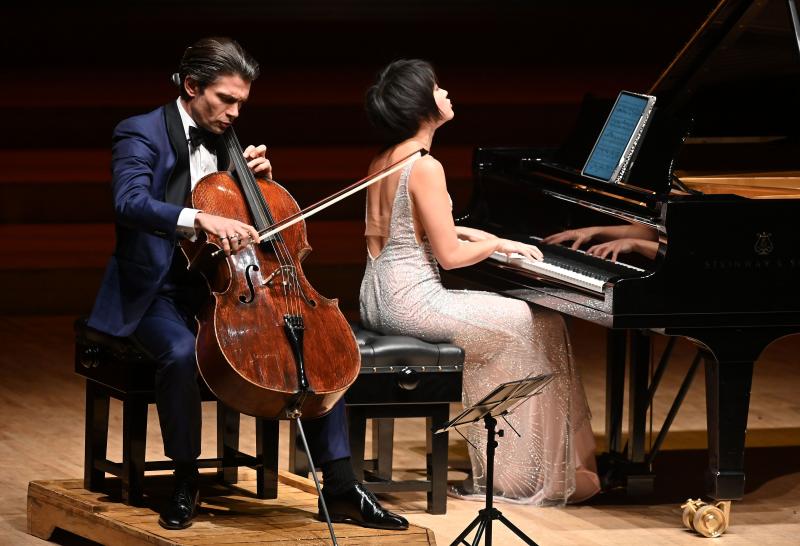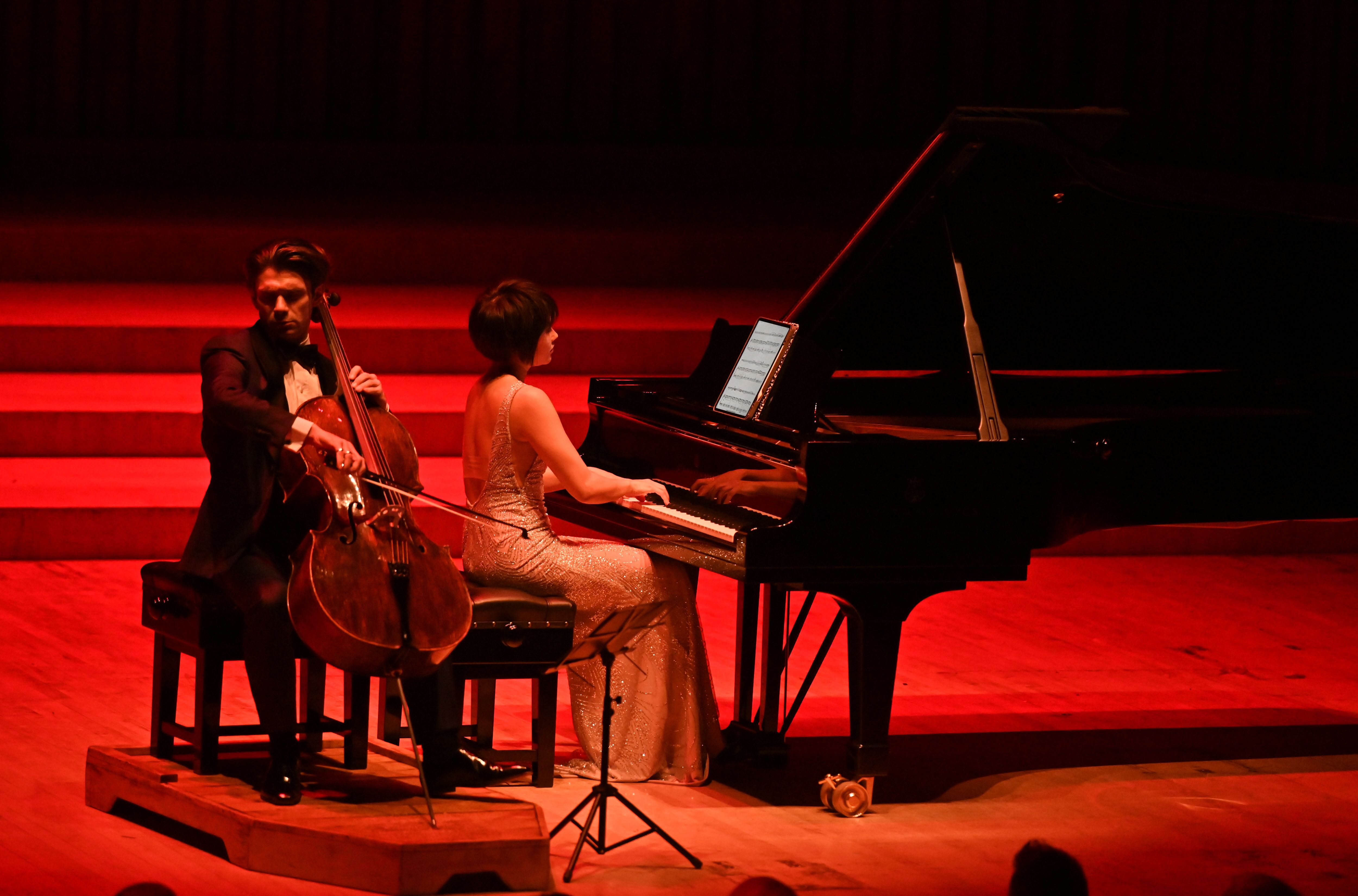Gautier Capuçon, Yuja Wang, Barbican review - spellbinding moments in circumscribed programme | reviews, news & interviews
Gautier Capuçon, Yuja Wang, Barbican review - spellbinding moments in circumscribed programme
Gautier Capuçon, Yuja Wang, Barbican review - spellbinding moments in circumscribed programme
It takes Piazzolla to ignite an audience after sophisticated Franck and Chopin

Why go to hear a cello-and-piano recital in a large hall, and a rather unsatisfying programme (delayed without explanation for 15 minutes, incidentally) spotlighting a transcription of a work which was created for the violin?
Capuçon the cellist didn't solve all problems in Jules Delsart's arrangement of Franck's A major Violin Sonata - a work ideally played by his brother Renaud. First, yes, a great singer among instrumentalists can capture most of the essence, just as sopranos and mezzos can reign supreme in Schubert and Mahler song cycles composed for tenors and baritones. But the restless, leaping and plunging theme which turns up in the slow movement and finale needs to hit the stratosphere. Fine-tuned to Wang's every subtlety, and she to his, Capuçon didn't seem best served by her fast tempi for scherzo and finale; these both needed just a bit more space to capture the singularity of their respective angst and heartease.  The not-quite 20-year-old Chopin's Introduction and Polonaise brillante puts pianistic transcendentalism very much in the spotlight, and Wang dazzled here; Capucon sang again, but the themes aren't so interesting (and the work's not a patch on the Andante spianato and Grande Polonaise brillante for piano solo). Maybe this should have been the encore, and not the big, unadvertised Le Grand Tango by Astor Piazzolla. Its dancing energy set the audience (and the lighting, pictured above) on fire; the central reverie had the same magical inwardness that made the Largo of Chopin's Cello Sonata another highlight: no overt sentimentality, only consummate proof that this is one of the most original elegies of the 19th century.
The not-quite 20-year-old Chopin's Introduction and Polonaise brillante puts pianistic transcendentalism very much in the spotlight, and Wang dazzled here; Capucon sang again, but the themes aren't so interesting (and the work's not a patch on the Andante spianato and Grande Polonaise brillante for piano solo). Maybe this should have been the encore, and not the big, unadvertised Le Grand Tango by Astor Piazzolla. Its dancing energy set the audience (and the lighting, pictured above) on fire; the central reverie had the same magical inwardness that made the Largo of Chopin's Cello Sonata another highlight: no overt sentimentality, only consummate proof that this is one of the most original elegies of the 19th century.
There's a comparably memorable idea in the Scherzo. But for all Wang's suspension of time in the opening Allegro moderato, and a totally together tumultuousness in the finale, this late work isn't as strikingly modern and adventurous as many of Chopin's contemporary pieces for solo piano. Nor are the outer movements among the greatest cello sonata inspirations. Another, more probing specimen from the 20th century - Martinů, Hindemith, Prokofiev, Shostakovich spring immediately to mind - would have rounded out a recital which still felt rather short measure. These are great artists, undoubtedly; one just wanted more. Which undoubtedly we'll get when Wang, "spotlit" Barbican artist, returns for a solo piano recital on 31 March.
Add comment
The future of Arts Journalism
You can stop theartsdesk.com closing!
We urgently need financing to survive. Our fundraising drive has thus far raised £49,000 but we need to reach £100,000 or we will be forced to close. Please contribute here: https://gofund.me/c3f6033d
And if you can forward this information to anyone who might assist, we’d be grateful.

Subscribe to theartsdesk.com
Thank you for continuing to read our work on theartsdesk.com. For unlimited access to every article in its entirety, including our archive of more than 15,000 pieces, we're asking for £5 per month or £40 per year. We feel it's a very good deal, and hope you do too.
To take a subscription now simply click here.
And if you're looking for that extra gift for a friend or family member, why not treat them to a theartsdesk.com gift subscription?
more Classical music
 BBC Proms: Alexander’s Feast, Irish Baroque Orchestra, Whelan review - rapturous Handel fills the space
Pure joy, with a touch of introspection, from a great ensemble and three superb soloists
BBC Proms: Alexander’s Feast, Irish Baroque Orchestra, Whelan review - rapturous Handel fills the space
Pure joy, with a touch of introspection, from a great ensemble and three superb soloists
 BBC Proms: Moore, LSO, Bancroft review - the freshness of morning wind and brass
English concert band music...and an outlier
BBC Proms: Moore, LSO, Bancroft review - the freshness of morning wind and brass
English concert band music...and an outlier
 Willis-Sørensen, Ukrainian Freedom Orchestra, Wilson, Cadogan Hall review - romantic resilience
Passion, and polish, from Kyiv's musical warriors
Willis-Sørensen, Ukrainian Freedom Orchestra, Wilson, Cadogan Hall review - romantic resilience
Passion, and polish, from Kyiv's musical warriors
 BBC Proms: The Marriage of Figaro, Glyndebourne Festival review - merriment and menace
Strong Proms transfer for a robust and affecting show
BBC Proms: The Marriage of Figaro, Glyndebourne Festival review - merriment and menace
Strong Proms transfer for a robust and affecting show
 BBC Proms: Faust, Gewandhausorchester Leipzig, Nelsons review - grace, then grandeur
A great fiddler lightens a dense orchestral palette
BBC Proms: Faust, Gewandhausorchester Leipzig, Nelsons review - grace, then grandeur
A great fiddler lightens a dense orchestral palette
 BBC Proms: Jansen, Royal Concertgebouw Orchestra, Mäkelä review - confirming a phenomenon
Second Prom of a great orchestra and chief conductor in waiting never puts a foot wrong
BBC Proms: Jansen, Royal Concertgebouw Orchestra, Mäkelä review - confirming a phenomenon
Second Prom of a great orchestra and chief conductor in waiting never puts a foot wrong
 BBC Proms: Royal Concertgebouw Orchestra, Mäkelä review - defiantly introverted Mahler 5 gives food for thought
Chief Conductor in Waiting has supple, nuanced chemistry with a great orchestra
BBC Proms: Royal Concertgebouw Orchestra, Mäkelä review - defiantly introverted Mahler 5 gives food for thought
Chief Conductor in Waiting has supple, nuanced chemistry with a great orchestra
 Dunedin Consort, Butt / D’Angelo, Muñoz, Edinburgh International Festival 2025 review - tedious Handel, directionless song recital
Ho-hum 'comic' cantata, and a song recital needing more than a beautiful voice
Dunedin Consort, Butt / D’Angelo, Muñoz, Edinburgh International Festival 2025 review - tedious Handel, directionless song recital
Ho-hum 'comic' cantata, and a song recital needing more than a beautiful voice
 Classical CDs: Dungeons, microtones and psychic distress
This year's big anniversary celebrated with a pair of boxes, plus clarinets, pianos and sacred music
Classical CDs: Dungeons, microtones and psychic distress
This year's big anniversary celebrated with a pair of boxes, plus clarinets, pianos and sacred music
 BBC Proms: Liu, Philharmonia, Rouvali review - fine-tuned Tchaikovsky epic
Sounds perfectly finessed in a colourful cornucopia
BBC Proms: Liu, Philharmonia, Rouvali review - fine-tuned Tchaikovsky epic
Sounds perfectly finessed in a colourful cornucopia
 BBC Proms: Suor Angelica, LSO, Pappano review - earthly passion, heavenly grief
A Sister to remember blesses Puccini's convent tragedy
BBC Proms: Suor Angelica, LSO, Pappano review - earthly passion, heavenly grief
A Sister to remember blesses Puccini's convent tragedy
 BBC Proms: A Mass of Life, BBCSO, Elder review - a subtle guide to Delius's Nietzschean masterpiece
Mark Elder held back from blasting the audience with a wall of sound
BBC Proms: A Mass of Life, BBCSO, Elder review - a subtle guide to Delius's Nietzschean masterpiece
Mark Elder held back from blasting the audience with a wall of sound

Comments
Agree with the comment about